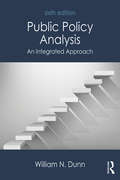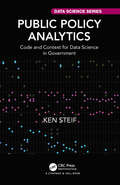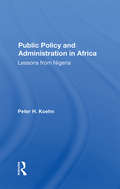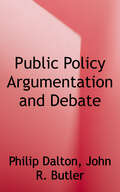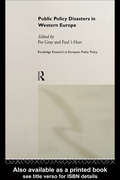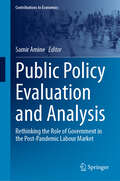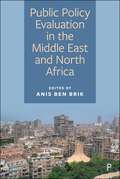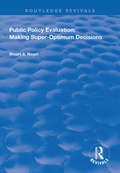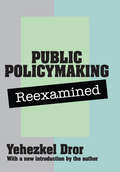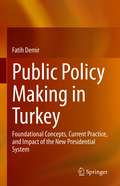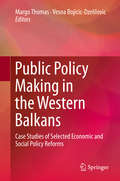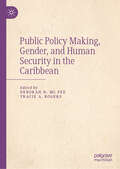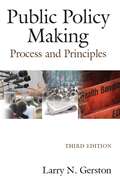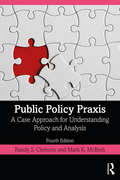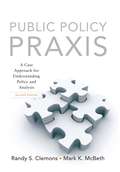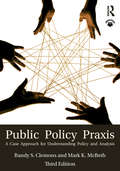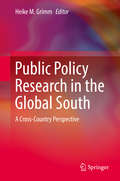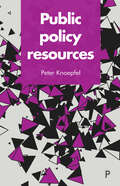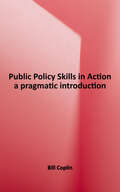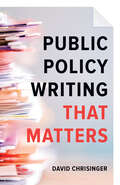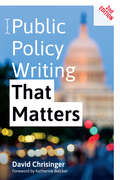- Table View
- List View
Public Policy Analysis
by William N DunnPublic Policy Analysis, the most widely cited book on the subject, provides readers with a comprehensive methodology of public policy analysis. Starting from the premise that policy analysis is an applied social science discipline designed for solving practical problems facing public and nonprofit organizations, the book bridges the gap between theory and practice. It provides practical skills for conducting policy analysis and communicating findings through memos, position papers, and other forms of structured analytical writing. The book asks readers to critically anazlye the arguments of policy practitioners as well as political scientists, economists, and political philosophers.
Public Policy Analysis (Fifth Edition)
by William N. DunnPublic Policy Analysis, the most widely cited book on the subject, provides readers with a comprehensive methodology of public policy analysis. Starting from the premise that policy analysis is an applied social science discipline designed for solving practical problems facing public and nonprofit organizations, the book bridges the gap between theory and practice. It provides practical skills for conducting policy analysis and communicating findings through memos, position papers, and other forms of structured analytical writing. The book asks readers to critically anazlye the arguments of policy practitioners as well as political scientists, economists, and political philosophers.
Public Policy Analysis: An Integrated Approach
by William N. DunnPublic Policy Analysis, the most widely cited book on the subject, provides students with a comprehensive methodology of policy analysis. It starts from the premise that policy analysis is an applied social science discipline designed for solving practical problems facing public and nonprofit organizations. This thoroughly revised sixth edition contains a number of important updates: Each chapter includes an all-new "big ideas" case study in policy analysis to stimulate student interest in timely and important problems. The dedicated chapter on evidence-based policy and the role of field experiments has been thoroughly rewritten and expanded. New sections on important developments in the field have been added, including using scientific evidence in public policymaking, systematic reviews, meta-analyses, and "big data." Data sets to apply analytical techniques are included online as IBM SPSS 23.0 files and are convertible to Excel, Stata, and R statistical software programs to suit a variety of course needs and teaching styles. All-new PowerPoint slides are included to make instructor preparation easier than ever before. Designed to prepare students from a variety of academic backgrounds to conduct policy analysis on their own, without requiring a background in microeconomics, Public Policy Analysis, Sixth Edition helps students develop the practical skills needed to communicate findings through memos, position papers, and other forms of structured analytical writing. The text engages students by challenging them to critically analyze the arguments of policy practitioners as well as political scientists, economists, and political philosophers.
Public Policy Analytics: Code and Context for Data Science in Government (Chapman & Hall/CRC Data Science Series)
by Ken SteifPublic Policy Analytics: Code & Context for Data Science in Government teaches readers how to address complex public policy problems with data and analytics using reproducible methods in R. Each of the eight chapters provides a detailed case study, showing readers: how to develop exploratory indicators; understand ‘spatial process’ and develop spatial analytics; how to develop ‘useful’ predictive analytics; how to convey these outputs to non-technical decision-makers through the medium of data visualization; and why, ultimately, data science and ‘Planning’ are one and the same. A graduate-level introduction to data science, this book will appeal to researchers and data scientists at the intersection of data analytics and public policy, as well as readers who wish to understand how algorithms will affect the future of government.
Public Policy And Administration In Africa: Lessons From Nigeria
by Peter KoehnOriginally published in 1990. A look at the vast, historically and socially complex nature of the Nigeria This book is intended to share what he has learned about public policy and administration in Africa over the past ten years. This book is based upon a decade of research, reflection, and writing. The field research period corresponds with the
Public Policy Argumentation and Debate: A Practical Guide for Advocacy
by Philip Dalton John R. ButlerThrough an exclusive focus on public policy advocacy as a practical endeavor, the authors Philip Dalton and John R. Butler depart from approaches to debate education that focus on the rules of simulated, academic debate formats. Beginning with the assumption that readers have already developed a basic capacity to argue, they offer practical guidance for determining the fundamental issues that make up a controversy and what expectations public audiences will have for advocacy based on the issues and the burdens of advocates challenging or defending the status quo. Through examples that span a wide range of advocacy situations and subjects of contemporary importance, the authors build a framework for public policy advocacy that is organic to the communication discipline, recover and refresh foundational lessons about the uses of evidence, and provide critical questions that can be used to develop and communicate policy proposals that are sensible and appealing. Written in an accessible, respectful, and motivational style, the book is suitable for students of debate, professionals who function as advocates, and people who find themselves wishing to voice their opinion on an issue of concern.
Public Policy Challenges Facing Higher Education In The American West
by Lester F. Goodchild Richard W. Jonsen Patty Limerick David A. LonganeckerPublic Policy Challenges Facing Higher Education in the American West is the first regional public policy study of American higher education. Presidents of the Western State Commission for Higher Education and the National Center for Higher Education Management Systems, alongside nationally recognized policy analysts and current western campus presidents, provosts, and administrators, tackle seven key public policy issues facing postsecondary education in the American West: student access, federal research funding, state governance, state financing, state appropriations and their relationship to institutional tuition, distance education and technology, and the role of community colleges. These analysts, researchers, and administrators offer a clear and complete analysis of the facts of each policy situation, the public policy options, and their connections to state and university relationships. Fifteen western states, including Alaska, California, and Hawaii, comprise the expansive region under discussion. With its companion volume, Higher Education in the American West: Regional History and State Contexts, this book is essential reading for higher education policymakers, scholars, and anyone who wants to know what the relationship between states and universities in the West has been and where it is going.
Public Policy Disasters in Europe (Routledge Research in European Public Policy)
by Pat Gray Paul’t HartThis book considers some recent and spectacular failures in policy-making and asks what is meant by policy 'disaster', the different forms that they can take and why they have occured. These issues are explored in nine contrasting cases drawn from both the European Union and its member states. These include: the devastating crisis in the Belgium political system following the exposure of a paedophile ring; the crisis in the Dutch fight against drugs; 'Mad Cows', the 'Arms to Iraq' affair in the UK; monetary union between West and East Germany; the Swedish monetary crisis of 1992; and the EU's common fisheries policy and policies towards civil war in Yugoslavia. This book is an excellent study of how and why policies can go wrong and highlights the limits of what governments can achieve in Western Europe.
Public Policy Evaluation and Analysis: Rethinking the Role of Government in the Post-Pandemic Labour Market (Contributions to Economics)
by Samir AmineThis edited volume examines how some OECD countries have adapted to new challenges in the labor market by evaluating and analyzing public programs implemented before, during, and after Covid-19. To gain a comprehensive understanding, the volume adopts a multidisciplinary approach, with chapters contributed by authors from diverse disciplines and academic and professional backgrounds.
Public Policy Evaluation in the Middle East and North Africa
by Anis Ben BrikThis book examines the progress of the development of public policy evaluation in the Middle East and North Africa (MENA) region from multiple perspectives. It describes both past developments and the current state of evaluation across the region, focusing on how political regimes, administrative traditions and policy advisory systems shape evaluation processes in different contexts. With contributions from a diverse list of international authors, it investigates the historical development of evaluation across the MENA region and analyses the political landscape, highlighting emerging trends and potential challenges that could influence the future of the field. An essential resource for researchers and practitioners in evaluation, public policy and the MENA region, the book also provides students with the practical knowledge and essential skills needed for careers in evaluation and policy analysis.
Public Policy Evaluation: Making Super-Optimum Decisions (Routledge Revivals)
by Stuart S. NagelFirst published in 1998, this volume examines how super-optimum decisions involve finding alternatives to controversies whereby Conservatives, Liberals, or other major groups can all come out ahead of their best initial expectations simultaneously. This book is organised in terms of concepts, methods, causes, process, substance, and the policy studies profession. Concepts clarify that policy evaluation traditionally involves: (1) Goals to be achieved; (2) Alternatives available for achieving them; (3) Relations between goals and alternatives; (4) Drawing a conclusion as to the best alternative in light of the goals, alternatives, and relations; and (5) Analysing how the conclusion would change if there were changes in the goals, alternatives, or relations. Super-optimizing also involves five related steps, but with the following improvements: (1) Goals are designed as conservative, liberal, or neutral; (2) Alternatives get the same designations; (3) Relations are simplified to indicate which alternatives are relatively high or low on each goal; (4) The conclusion involves arriving at an alternative that does better on Goal A than Alternative A, and simultaneously better on Goal B than Alternative B; and (5) The fifth step involves analysing the super-optimum or win-win alternative in terms of its feasibility as to the economic, technological, psychological, political, administrative, and legal matters.
Public Policy For Women
by Jane Pulkingham Marjorie Griffith CohenContaining essays from leading feminist academics, and social activists, Public Policy for Women addresses important public policy issues that fail to address women's needs. The volume's contributors pay particular attention to the relationship between the welfare state and vulnerable populations of women, while making substantial contributions to current public policy debates in Canada.Focusing on discussions of controversial issues such as single working mothers, prostitution, mandatory retirement, guaranteed income, and work for welfare, these essays also consider the political and economic constraints that have been brought about by neo-liberal policy changes. Full of relevant policy critiques and original recommendations for improvement, Public Policy for Women readdresses often neglected subjects and concerns and makes informative appeals for public policy to address women's needs.
Public Policy Making Reexamined
by Yehezkel DrorPublic Policymaking Reexamined is now recognized as a fundamental treatise for public policy studies. Although it caused much controversy when it was first published for its systematic approach to policy studies, the book is acknowledged as a modern classic of continuing importance for the teaching and research of public policy, planning and policy analysis, and public administration. The paperback includes a new introduction updating and supplementing many of the author's original ideas.Professor Dror combines the approaches of policy analysis, behavioral science, and systems analysis in his examination of the reality of public policymaking and his suggestions for its reform. Actual policymaking is carefully evaluated with the help of explicit criteria and standards based on an optimal model approach, resulting in detailed proposals for improvement. He applies a scientific orientation to the study of social facts and theory.
Public Policy Making in Turkey: Foundational Concepts, Current Practice, and Impact of the New Presidential System
by Fatih DemirThis volume discusses public policy making in Turkey. Using Turkey as an overarching case study, the author presents foundational concepts of public policy analysis. The method followed in the book is from general to specific: in each chapter, the relevant public policy stage or concept is explained and discussions from international literature are provided first. Then, Turkish cases are presented and clarified using theoretical concepts and debates. Additional examples from other municipalities are included for a comparative perspective. This volume will be of use to researchers and students studying public policy, policy analysis, and global public administration as well as professionals, policymakers, and diplomats working in the Turkish public sector.
Public Policy Making in the Western Balkans
by Margo Thomas Vesna Bojicic-DzelilovicDeveloping and 'transition' economies face myriad challenges in their attempts to achieve and maintain political stability and foster the economic growth essential for national security, the social well-being of current citizens and sustainable environments for future generations. Governments in the Western Balkans have striven to achieve all of the above, and this volume assesses the nature of their experiences as well as the level of their success in doing so. Featuring detailed case studies of public policy reforms in the region as well as comparative analysis on a range of indicators, the book analyzes the role of key players in setting the political agenda as well as implementing policy reforms. It also distils the lessons that can be learned from the Western Balkan experience, recommending strategies for enhancing the policy making process. In addition, it examines the developmental role played by the full spectrum of policy actors, including the private sector, NGOs, special interest groupings, international financial institutions, donor nations and the EU. Each case study has been prepared by academics with deep knowledge and experience of the western Balkans and addresses a core set of questions: identifying the policy issue and its broader context, defining the roles of specific individuals in formulating policy and reform and assessing the influence of networks and coalitions in the policy making process. With so little detailed literature on public policy making in a group of nations strategically positioned between Europe, Russia and the near East, the detailed insights provided by this volume will be widely welcomed. Our book provides case studies of specific public policy reform episodes in selected Western Balkan post-conflict and transition countries. The focus of these case studies extends beyond the technical aspects and entails substantive examination of the policy actors, constituencies and politics that ultimately shape the policy that emerges from the policy making process. This analysis draws lessons for strengthening the quality of policies, the transparency, consistency, and governance of the policy making process and ultimately for contributing to economic and social development of the region.
Public Policy Making, Gender, and Human Security in the Caribbean
by Deborah N. Mc Fee Tracie A. RogersThis edited collection brings together the work of practitioners, civil society actors, and academics, either located in the Caribbean, or involved in Caribbean-based work on public policy making and its implementation. The compendium challenges traditional dichotomies of external versus internal actors in the policy process, thereby, framing Caribbean public policy as a complex multi stakeholder undertaking. The collection is informed by three broad thematic areas: Gender and Policymaking, Human Security and Social Policy. Sub-themes include Gun Violence and CARICOM Small Island Developing States and the People Face/ Social Cost of Climate Change. This volume is ideal for researchers, policy-makers, academics, and graduate students.
Public Policy Making: Process and Principles
by Larry N. GerstonThis brief text identifies the issues, resources, actors, and institutions involved in public policy making and traces the dynamics of the policymaking process, including the triggering of issue awareness, the emergence of an issue on the public agenda, the formation of a policy commitment, and the implementation process that translates policy into practice. Throughout the text, which has been revised and updated, Gerston brings his analysis to life with abundant examples from the most recent and emblematic cases of public policy making. At the same time, with well-chosen references, he places policy analysis in the context of political science and deftly orients readers to the classics of public policy studies. Each chapter ends with discussion questions and suggestions for further reading.
Public Policy Praxis: A Case Approach for Understanding Policy and Analysis
by Randy S. Clemons Mark K McBethPublic administration and policy analysis education have long emphasized tidiness, stages, and rationality, but practitioners frequently must deal with a world where objectivity is buffeted by, repressed by, and sometimes defeated by value conflict. Politics and policy are "messy" and power explains much more about the policy process than does rationality. Public Policy Praxis, now in a thoroughly revised fourth edition, uniquely equips students to better grapple with ambiguity and complexity. By emphasizing mixed methodologies, the reader is encouraged, through the use of a wide variety of policy cases, to develop a workable and practical model of applied policy analysis. Students are given the opportunity to try out these globally applicable analytical models and tools in varied case settings (e.g., county, city, federal, international, plus urban and rural) while facing wide-ranging topics (starving farmers and the red panda in Nepal, e-cigarettes, GMOs, the gig economy, and opioid abuse) that capture the diversity and reality of public policy analysis and the intergovernmental and complex nature of politics. The fourth edition expands upon its thorough exploration of specific tools of policy analysis, such as stakeholder mapping, content analysis, group facilitation, narrative analysis, cost-benefit analysis, futuring, and survey analysis. Along with teaching "how to," the authors discuss the limitations, the practical political problems, and the ethical problems associated with different techniques and methodologies. Many new cases have been added, along with clear instructions on how to do congressional research and a Google Trends analysis. An expanded online Teaching Appendix is included for adopters, offering original cases, answers to problems, alternative approaches to case use, teaching exercises, student assignments, pedagogical ideas, and supplemental material directly tied to concepts covered in the text. With an easily accessible and conversational writing style, Public Policy Praxis is an ideal textbook for undergraduate and graduate courses in public policy analysis, community planning, leadership, social welfare policy, educational policy, family policy, and special seminars.
Public Policy Praxis: A Case Approach for Understanding Policy and Analysis
by Mark K Mcbeth Randy S. ClemonsPublic administration and policy analysis education has long emphasized tidiness, stages, and rationality, but practitioners frequently must deal with a world where objectivity is buffeted by, repressed by, and sometimes defeated by, value conflict. Too often public administration education has failed individuals who must deal with the hustle and bustle and complexity of policymaking. Public Policy Praxis equips students to grapple with ambiguity and complexity. By emphasizing mixed methodologies and through the use of cases, students are encouraged to develop a workable and practical model of applied policy analysis. Throughout the book, Clemons and McBeth argue that pragmatism demands that analysts learn to think politically and to understand that public problems are socially constructed. As such, in addition to analytical models, the authors examine specific tools of policy analysis, such as stakeholder mapping, content analysis, group facilitation, narrative analysis, cost-benefit analysis, futuring, and survey analysis. Students are given the opportunity to try out these analytical models and tools in varied case settings (county, city, federal, urban, and rural) facing wide-ranging topics (economic development, expansion of human services in an urban area, building a health care clinic in a small town, an inner-city drug program, and the bison controversy in Yellowstone National Park) that capture the diversity of public policy and the intergovernmental nature of politics. With chapters written to the student and in a nearly conversational style, Public Policy Praxis is an ideal textbook for undergraduate and graduate courses in public policy analysis, community planning, leadership, social welfare policy, educational policy, family policy, and special seminars.
Public Policy Praxis: A Case Approach for Understanding Policy and Analysis
by Randy Clemons Mark McBeth<p>Public administration and policy analysis education has long emphasized tidiness, stages, and rationality, but practitioners frequently must deal with a world where objectivity is buffeted by, repressed by, and sometimes defeated by, value conflict. Too often public administration education has failed individuals who must deal with the hustle and bustle and complexity of policymaking. Public Policy Praxis equips students to grapple with ambiguity and complexity. By emphasizing mixed methodologies and through the use of cases, students are encouraged to develop a workable and practical model of applied policy analysis. <p>Throughout the book, Clemons and McBeth argue that pragmatism demands that analysts learn to think politically and to understand that public problems are socially constructed. As such, in addition to analytical models, the authors examine specific tools of policy analysis, such as stakeholder mapping, content analysis, group facilitation, narrative analysis, cost-benefit analysis, futuring, and survey analysis. Students are given the opportunity to try out these analytical models and tools in varied case settings (county, city, federal, urban, and rural) facing wide-ranging topics (economic development, expansion of human services in an urban area, building a health care clinic in a small town, an inner-city drug program, and the bison controversy in Yellowstone National Park) that capture the diversity of public policy and the intergovernmental nature of politics. <p>With chapters written to the student and in a nearly conversational style, Public Policy Praxis is an ideal textbook for undergraduate and graduate courses in public policy analysis, community planning, leadership, social welfare policy, educational policy, family policy, and special seminars.</p>
Public Policy Research in the Global South: A Cross-Country Perspective
by Heike M. GrimmThis volume focuses on the evolution of public policy and the role of agenda setting with regard to policymaking in countries of the Global South. The authors illustrate the emergence of public policy research as an academic discipline, and highlight various aspects of history, governance, politics, and economics as components of public policy theory development. By offering a cross-national perspective, the papers contribute to a better understanding of when, how, and by whom a given policy agenda is designed, which is essential to grasping how policy is implemented. In turn, the authors investigate how the development of public policy research has influenced policymaking in fields such as democratization, migration, corruption, agriculture, environment, education, and entrepreneurship and, more specifically, agenda setting in selected countries of the Global South.
Public Policy Resources
by Peter KnoepfelBuilding on Knoepfel’s previous book, Public policy analysis, this book offers a conceptually coherent view of ten public policy resources: force, law, personal, money, property rights, information, organisation, consensus, time and political support. The book demonstrates the interplay of the different resources in a conceptually coherent framework and presents numerous illustrations of ways of mobilising the resources and managing them in a sustainable way, resource exchanges and the role of institutions governing the interrelationships between actors and resources. The book will be valuable to postgraduate students as well as those working in policy programming and implementation across both public and private sectors and in non-governmental organisations.
Public Policy Skills in Action: A Pragmatic Introduction
by Bill CoplinIn this completely revised edition, the author continues to prepare the next generation of leaders to bring their hearts and minds to solving the many problems that we face in the twenty-first century. The book teaches students the essential components of public policy analysis; how to get information from published sources and individuals; how to survey stakeholders; formulate public policy; examine the costs and benefits of a policy; develop political strategies; write a briefing paper; among other skills.
Public Policy Writing That Matters
by David ChrisingerHone your public policy writing—and make a significant impact on the world.Students and professionals across a variety of disciplines need to write public policy in a manner that inspires action and genuine change. You may have amazing ideas about how to improve the world, but if you aren’t able to communicate these ideas well, they simply won’t become reality. In Public Policy Writing That Matters, communications specialist David Chrisinger argues that public policy writing is most persuasive when it tells clear, concrete stories about people doing things. Combining helpful hints and cautionary tales with writing exercises and excerpts from sample policy documents, Chrisinger teaches readers to craft concise, story-driven pieces that exceed the stylistic requirements and limitations of traditional policy writing.Too often, public policy writing is convoluted, opaque, and exclusive. Chrisinger, who teaches introductory policy writing courses around the country, offers a step-by-step guide for anyone interested in planning, organizing, developing, writing, and revising accessible public policy. From the most effective use of data visualization, the best way to write a sentence, and the ideal moment to add a compelling anecdote to advice on using facts to strengthen an argument, this little book, inspired by Strunk & White’s classic style guide, will allow anyone crafting public policy to make a bigger impact. Aimed at helping students and professionals overcome their default impulses to merely "explain," this book reveals proven, classroom-tested tips for writing sophisticated policy that is also easy to understand. This practical, concise handbook will not only aid students throughout graduate school but will also remain a reference to consult throughout their professional careers. A vital tool for any policy writer or analyst, Public Policy Writing That Matters is a book for everyone passionate about using writing to effect real and lasting change.
Public Policy Writing That Matters
by David ChrisingerA thoroughly updated and expanded guide to honing your public policy writing skills—and making a significant impact on the world.Professionals across a variety of disciplines need to write about public policy in a manner that inspires action and genuine change. You may have amazing ideas about how to improve the world, but if you aren't able to communicate these ideas well, they simply won't become a reality. In Public Policy Writing That Matters, communications expert David Chrisinger, who directs the Harris Writing Program at the University of Chicago and worked in the US Government Accountability Office for a decade, argues that public policy writing is most persuasive when it tells clear, concrete stories about people doing things. Combining helpful hints and cautionary tales with writing exercises and excerpts from sample policy analysis, Chrisinger teaches readers to craft concise, story-driven pieces that exceed the stylistic requirements and limitations of traditional policy writing.Aimed at helping students and professionals overcome their default impulses to merely "explain," this book reveals proven tips—tested in the real world and in the classroom—for writing sophisticated policy analysis that is also easy to understand. For anyone interested in planning, organizing, developing, writing, and revising accessible public policy, Chrisinger offers a step-by-step guide that covers everything from the most effective use of data visualization to the best ways to write a sentence, from the ideal moment for adding a compelling anecdote to advice on using facts to strengthen an argument. This second edition addresses the current political climate and touches on policy changes that have occurred since the book was originally published. A vital tool for any policy writer or analyst, Public Policy Writing That Matters is a book for everyone passionate about using writing to effect real and lasting change.


